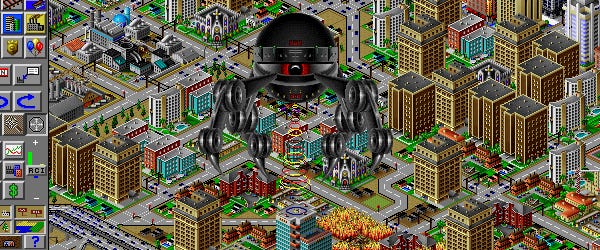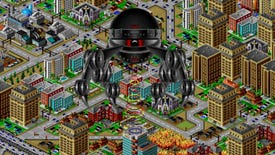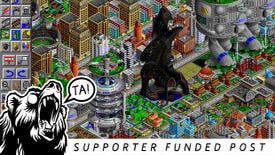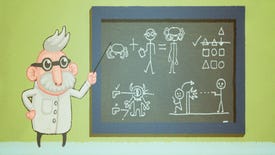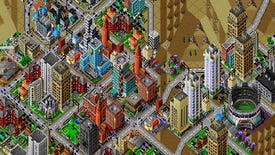Gaming Made Me: Sim City 2000
This week in Gaming Made Me, Wired UK's Duncan Geere recalls how Sim City 2000 (and its incredible manual) taught him utopian values, gave him a life-long fascination with impossible habitats and brought about a new sense of just what manner of strange beast is a city.
I still have the manual for SimCity 2000. The game CD, or perhaps even floppy disks -- I can't remember -- have long disappeared, but I still own the manual. About once a year, I leaf through it - not for nostalgia, but because it's such a beautiful creation.
It opens with a quote from the Danish urban planner, Steen Eiler Rasmussen: "To search for the ideal city today is useless. For all cities are different."
Spread throughout the rest of the book, on every other page or so, are more quotes - chosen by the architect Richard Bartlett. At the end of the manual is a "gallery" of art, poetry, essays, and short stories that address people's experiences of and feelings about cities.
As an eleven-year-old kid this blew my tiny little mind. I'd lived in cities for much of my life, but I'd never really thought of them as a whole -- as more than a collection of houses, streets, and neighborhoods.
I'd never considered that a particular road layout might be more than just filling the space between buildings. I'd never considered that a public transit network might be based on principles honed over decades or even centuries. I'd never considered that town planning might be just as much of an art as a science.
Playing SimCity 2000, I was able to tune out much of what ailed my eleven-year-old self -- mostly homework and the perpetual cold that every child of a certain age suffers from. I was able to really lose myself for the very first time. I'd played NES games before but I never really felt much of a connection to them -- they never grabbed me in a way that Maxis' city-building simulator managed to do.
The reason it had such a powerful effect was because it fueled my imagination. I imagined living in the streets that I was building on the screen, working in the warehouses and chemical plants and driving back over the suspension bridge to my home on the far side of the lake.
Oddly there were never any other people in this vision. There were buildings, cars, and roads, but no actual people -- just like the game itself. Other games around the same time tried to include people, but failed miserably -- ending up with cartoonish caricatures.
Certain aspects of SimCity 2000 have stayed with me more than others. The inexplicably angry transport advisor. Building my Mayor's house on a raised area surrounded by waterfalls. Power plants exploding every half-century. The demented newspaper articles that referred to llamas on every other line. Reticulating splines.
But it was Arcologies in particular that caught my imagination and are something I'm still utterly fascinated by today. To my eleven-year-old credit, I totally understood the concept of what they are -- enormous self-sufficient skyscrapers with almost everything necessary for their population -- food, clean air, power, water, etc.
In practice, like so many great ideas, they don't quite work. Despite a number of noble experiments, mankind doesn't yet seem to have the technology or the willpower to bring a functioning arcology into existence. A lot of its central concepts, in particular the self-sufficiency and sustainability aspects, are being integrated into planned communities, but despite several attempts, no-one seems to be able to complete one.
Nonetheless, with the naivety of youth, my mind conjured up images of future civilisations, leaving behind the roads, police stations and residental zones of the ground in favour of vast, soaring constructions that they'd never need to leave.
It laid a utopic streak in my thinking at a crucial time in my life, one which I'm enormously grateful for today.
But almost more notable, going back to the game now, are the things I didn't understand at the time. The things that my young mind couldn't or just didn't process. I never appreciated the concept of land value -- to me, four houses squeezed onto the same plot was as good as one big house with a swimming pool. I also never appreciated the negative effect that raising taxes had on the population and on growth. I didn't get why putting up the tax rate made the amount of money I was making go down over time.
One small aspect of the game that I didn't understand at all was a particular scenario titled Dullsville. It puts you in charge of a small town in mid-western America where there's no entertainment, nothing to do. At the time, I thought this was funny. How could there be a town where all the residents were bored? It wasn't until much later that I realised that it was a deeply accurate portrayal of middle America, characterising the existential boredom of a generation of young people with nothing to do.
The curious thing about SimCity 2000 is that it simulates a very American city. I didn't realise this at the time, and it was probably my first significant experience of large US cities -- way before I ever got to visit one.
When -- ten years later -- I did get to visit the United States, I felt a powerful pang of nostalgia for something that I knew I'd never actually experienced, which was a very odd sensation indeed.
This sensation was fuelled by aspects of the game that reflect a uniquely American perspective on what a city is -- the highways and onramps, the colleges, the zoning system and grid layouts. Most of all, it's demonstrated by the difficulty of building a functional and effective railway system.
But the question of what a city is, what its soul looks like, and what type of personality it has is very much what SimCity 2000 is all about. That stood in contrast to superficially similar games around the same time, like Transport Tycoon or Theme Park, which generally task you with finding a solution to a problem. Instead, SimCity 2000 is about creating something beautiful, and then trying to manage the problems that come with it.
Doing that hundreds of times over taught me that you can have a dream in your head, succeed in following it to the letter and making it happen, and you'll find all kinds of problems in it that you weren't expecting. Just like the people trying to build arcologies in the real world. Just like the residents of Dullsville, who have a life coveted by a huge proportion of the world's population, but can't enjoy it.
SimCity 2000 taught me that, but showed me that it didn't matter -- because it's the dream, not the problems, that's important. Nowhere is that more evident than in SimCity 2000's manual with its pictures, poetry and quotes. Michael Bremer, the chap responsible, who worked at Maxis between 1994 and 1998, had a dream of the greatest videogame manual the world has ever seen. He achieved it.
